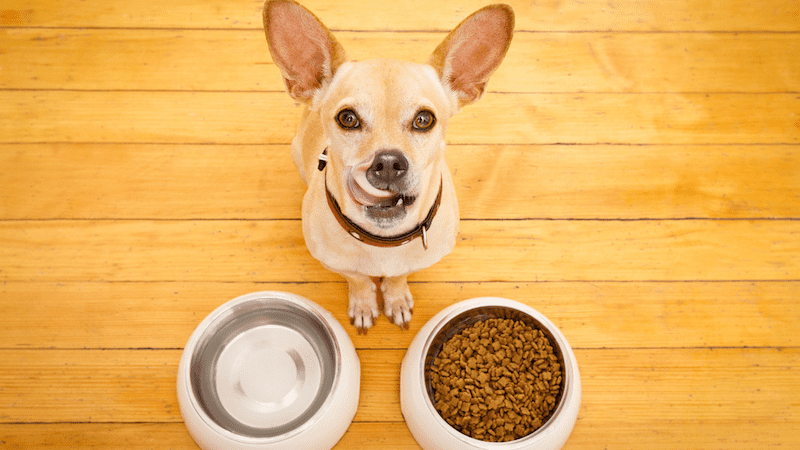The term “sensitive stomach” might sound like a catch-all for dogs dealing with stomach issues, but digestion difficulties may be a sign of something more than a delicate constitution. Dogs can experience a range of stomach issues, some of which are potentially serious and require veterinarian consultation. However, once any serious medical concerns have been ruled out, the remedy may simply be a change in diet.
One of the definitions for sensitive is “quick to detect or respond to slight changes, signals, or influences.” This can remind us that change, no matter how small, can cause distress; any major change should be made gradually, if possible — especially when it comes to our pets. In this post, we will look at some causes of gastrointestinal (GI) sensitivity in dogs and some ideas for addressing the issue through a gradual change in diet.
How to Determine If Your Dog Has a Sensitive Stomach
How can you know if your dog has a sensitive stomach? Although your canine companion can’t verbalize his or her specific stomach troubles, one of three symptoms are fairly reliable indicators of an issue:
- Episodic vomiting
- Loose or watery stools
- Frequent or unusual flatulence (i.e., more pungent than usual)
One or more of these symptoms can indicate stomach sensitivity, and each can be a sign of a more severe issue.
What Causes a Sensitive Stomach in Dogs?
By its very definition, a sensitive stomach is a reaction to a root cause. Identifying this cause is the key to determining the right course of action needed to remedy the issue. The following is a list of common causes of stomach sensitivity in dogs:
Obstructions
Dogs are notorious for eating almost anything they come across. Unfortunately, not everything is digestible and some items can block the GI tract.
Malabsorption
Although difficult to diagnose, some dogs are not able to absorb adequate nutrition from food. This is usually caused by an insufficient release of enzymes from the pancreas, which help to properly break down food.
Bowel Disease
Like inflammatory bowel disease (IBD) in humans, dogs can experience uncomfortable inflammation of the bowels. It is sometimes difficult to determine whether a dog’s stomach issues are caused by IBD, but the remedy is often a bland diet of rice and chicken.
Cancer
Although cancer is one of the rarer causes of stomach issues in dogs, stomach pain is a hallmark symptom of any cancer of the digestive system.
Motion Sickness
This queasiness is not always caused by a ride in the car; in fact, motion sickness can occur when a dog experiences any unusual movement.
Ulcers
When a dog’s stomach lining is damaged in any way, the entire organ becomes much more sensitive to food.
Bloating
Bloating is caused by a buildup of gas in the stomach, and a serious case can be a medical emergency. Gastric dilation volvulus (GDV) happens when a dog’s stomach twists when stretched, blocking the blood supply to other internal organs. If left untreated, GDV can lead to death — symptoms including pacing, excessive drooling and general distress should be a signal to call your veterinarian’s emergency line immediately.
Inflammation and Obstructions (not caused by ingestion)
Intestinal scar tissue or the “telescoping” of the intestine (when one section collapses on another) can cause blockages in the digestion process.
The Best Dog Foods for Dogs with Sensitive Stomachs
Before changing your dog’s diet, any serious medical conditions should be ruled out or addressed. If your dog’s stomach sensitivity isn’t caused by any of the above conditions, the culprit may be food intolerance or allergy. Short of performing a full allergy panel, which can be costly or inaccessible to some pet owners, the most effective way to identify food allergies or intolerances in canines is through an elimination diet.
Some dogs can have isolated food allergies, but it is more common to meet a dog who has multiple food allergies. Here is a list of ingredients we know to trigger adverse reactions in some (but certainly not all) dogs:
- Beef
- Dairy
- Wheat
- Egg
- Chicken
- Soy
Elimination Diet for Dogs
In an elimination diet, certain foods (usually animal proteins) are removed from a dog’s diet one at a time. Dogs should eat meals with one ingredient removed for a solid week, while owners observe any effect that the ingredient’s removal has had on the dog’s symptoms. For example, if your dog regularly eats a diet of rabbit meat, chicken gizzards and canned pumpkin, try removing the chicken gizzards for one week to see if your dog’s symptoms change or improve, followed by the other ingredients in turn.
Incorporating minimally processed foods with small ingredient lists ensures that your dog receives adequate protein during an elimination diet. Recipes that are not rendered deliver more complete nutrition than foods that contain meal.
WATCH NOW: WHY MINIMALLY PROCESSED IS BETTER
Does Your Dog Have a Food Intolerance or Allergy?
Although the terms “food intolerance” and “food allergy” can be confusing and are sometimes used interchangeably, each is a distinct condition.
A food allergy is an adverse reaction to a protein found in food, often from animal sources, that triggers a response by the dog’s immune system. On the other hand, a food intolerance does not directly initiate an immune response, although it does cause a GI response.
Adverse reactions can range from subtle to dramatic, and it can be unclear whether they are caused by an allergy or intolerance. Dogs can have gastrointestinal reactions caused by:
Food poisoning: When a dog consumes spoiled food, toxic plants, too much of a certain nutrient or foods known to be harmful to dogs, they can experience food poisoning.
Food additives: Unnecessary or nutritionally barren ingredients are what primarily set commercial pet foods apart from raw or minimally processed recipes. Many dogs experience adverse reactions to preservatives like disulfide and carrageenan.
Carbohydrates: Excessive carbohydrate consumption has been linked to obesity in dogs, but carbohydrate intolerance is less common. However, many dogs experience lactose intolerance to the carbs in cow’s and goat’s milk.
Non-food items: Some dogs frustrate their owners because they seem to eat everything they come across — socks, other animals’ feces, rocks, etc. this behavior can either be caused by simple curiosity or a more serious condition called pica, which may indicate that your dog is lacking essential nutrients in their diet. Undigestible items can cause obstructions in a dog’s digestive tract or be toxic to the dog’s system. If you believe that your dog has consumed something they shouldn’t have, contact your veterinarian right away.
An allergy panel can help you determine if your dog is experiencing adverse reactions cause by an allergy or an intolerance, after which an animal nutritionist can help you adjust their diet accordingly.
How Does RAWZ Fit In?
If your dog’s stomach problem is found to be a food allergy or general intolerance, RAWZ may be able to help. Since chicken is frequently identified as a protein allergen (or at least an ingredient that causes distress), RAWZ offers two chicken-free recipes with a single, alternative animal protein source.
As a small, family-run business, we are committed to offering options for pet parents with our “When Only the Best Will do” nutritional philosophy. We launched in 2015 with our two original Chicken and Salmon recipes for dogs, but shortly thereafter, we started receiving a number of requests for chicken-free options. This led us to formulate the Limited Real Duck and Wild Caught Salmon Recipes. Our original formulas of these recipes contain 40% protein levels, but these two are formulated with 25% protein for easier digestibility. Both recipes feature a single source of animal protein and are minimally processed without the use of meals or rendered fats, just like our original meal free recipes. Plus, both options feature Miscanthus grass as a non-GMO, sustainable and gentle fiber source!
RAWZ takes great pride in being transparent, so our foods do not contain any hidden animal ingredients. We only use the animal proteins listed on the front of the label and do not add any chicken fat to our foods. For dogs with allergies or sensitive stomachs, our 96% meat pâté cans may be a great compliment to our limited recipes as they have a very simple ingredient list.
We created RAWZ Limited Recipes because we care about your pets’ comfort and optimal nutrition, and want all pets to have access to delicious, minimally processed options. Plus, every purchase of RAWZ contributes to causes that improve the lives of people through the RAWZ Fund — it’s a win-win!






